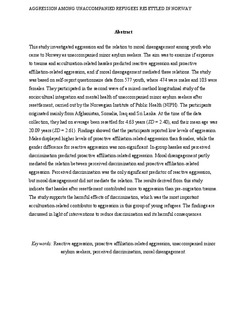| dc.contributor.advisor | Sjøberg, Britt-Marie Drottz | |
| dc.contributor.author | Gjelsvik, Linn Namtvedt | |
| dc.contributor.author | Solhaug, Anne Kristine Nilsen | |
| dc.date.accessioned | 2017-08-10T07:56:39Z | |
| dc.date.available | 2017-08-10T07:56:39Z | |
| dc.date.issued | 2017 | |
| dc.identifier.uri | http://hdl.handle.net/11250/2450360 | |
| dc.description.abstract | This study investigated aggression and the relation to moral disengagement among youth who came to Norway as unaccompanied minor asylum seekers. The aim was to examine if exposure to trauma and acculturation-related hassles predicted reactive aggression and proactive affiliation-related aggression, and if moral disengagement mediated these relations. The study was based on self-report questionnaire data from 577 youth, where 474 were males and 103 were females. They participated in the second wave of a mixed-method longitudinal study of the sociocultural integration and mental health of unaccompanied minor asylum seekers after resettlement, carried out by the Norwegian Institute of Public Health (NIPH). The participants originated mainly from Afghanistan, Somalia, Iraq and Sri Lanka. At the time of the data collection, they had on average been resettled for 4.63 years (SD = 2.40), and their mean age was 20.09 years (SD = 2.61). Findings showed that the participants reported low levels of aggression. Males displayed higher levels of proactive affiliation-related aggression than females, while the gender difference for reactive aggression was non-significant. In-group hassles and perceived discrimination predicted proactive affiliation-related aggression. Moral disengagement partly mediated the relation between perceived discrimination and proactive affiliation-related aggression. Perceived discrimination was the only significant predictor of reactive aggression, but moral disengagement did not mediate the relation. The results derived from this study indicate that hassles after resettlement contributed more to aggression than pre-migration trauma. The study supports the harmful effects of discrimination, which was the most important acculturation-related contributor to aggression in this group of young refugees. The findings are discussed in light of interventions to reduce discrimination and its harmful consequences. | nb_NO |
| dc.language.iso | eng | nb_NO |
| dc.publisher | NTNU | nb_NO |
| dc.subject | reactive aggression | nb_NO |
| dc.subject | proactive affiliation-related aggression | nb_NO |
| dc.subject | unaccompanied minor asylum seekers | nb_NO |
| dc.subject | perceived discrimination | nb_NO |
| dc.subject | moral disengagement | nb_NO |
| dc.title | Aggression among unaccompanied refugees resettled in Norway | nb_NO |
| dc.type | Master thesis | nb_NO |
| dc.subject.nsi | VDP::Samfunnsvitenskap: 200::Psykologi: 260 | nb_NO |
